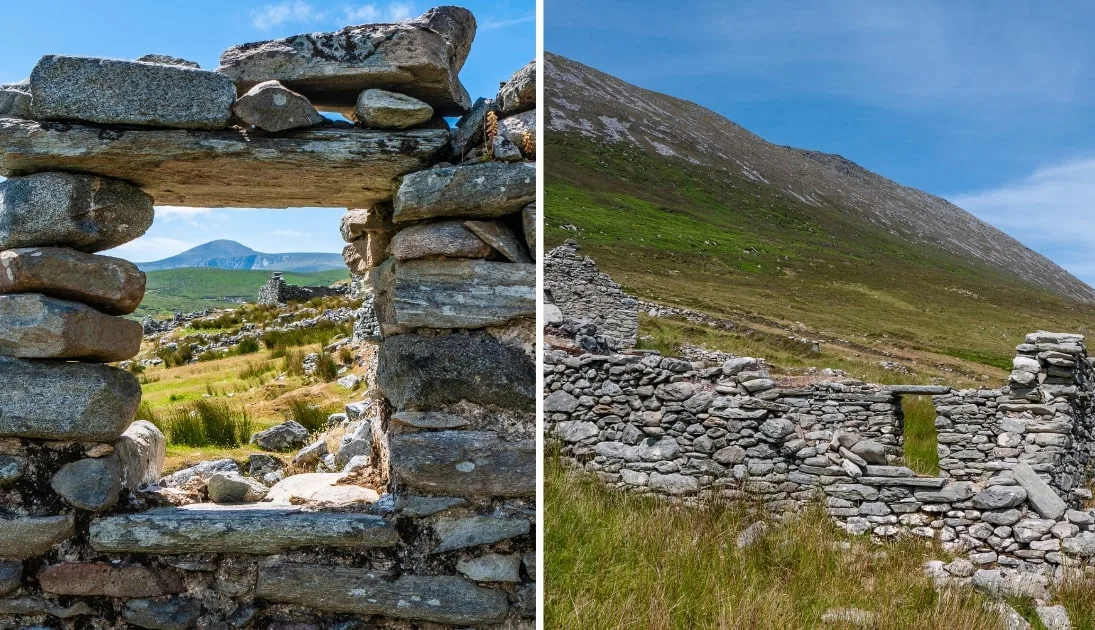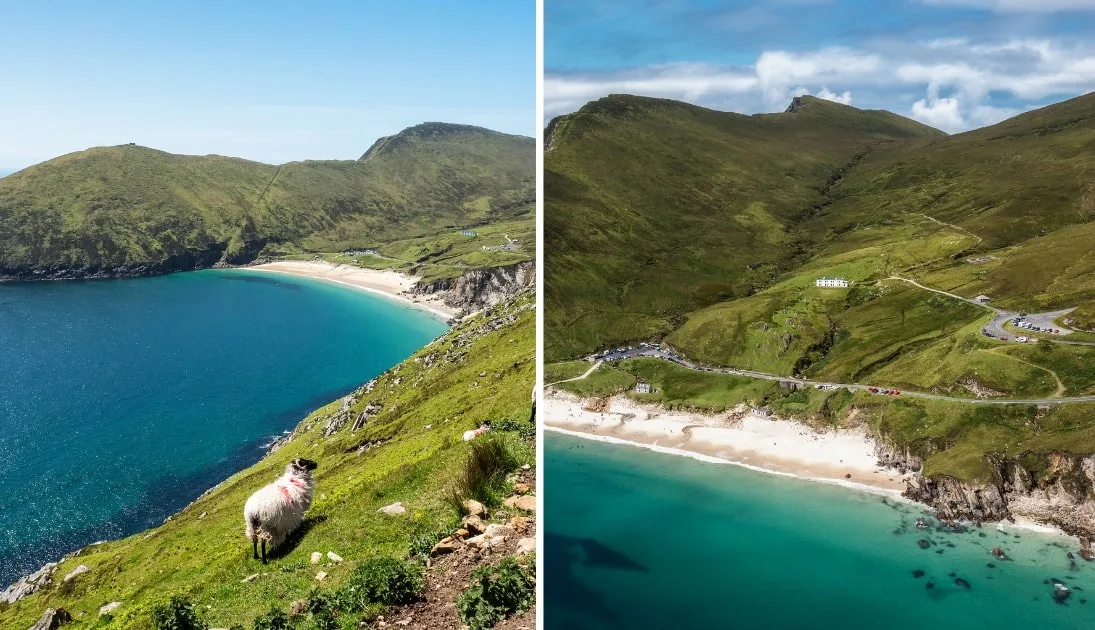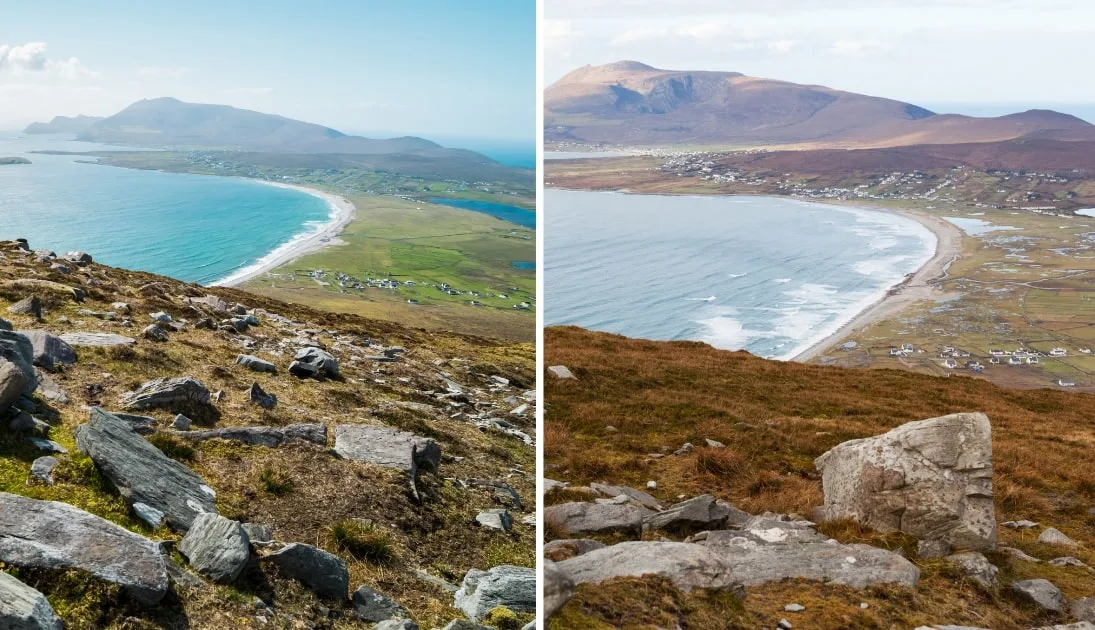A walk around the Deserted Village on Achill is an eerie, yet beautiful experience.
You’ll find it one the southern slope of Slievemore Mountain where it’s home to between 80 to 100 cottages.
Below, you’ll find info on where to park to the story behind the Slievemore Deserted Village.
Some quick need-to-knows about the Deserted Village

Photo via Shutterstock
Exploring the Deserted Village on Achill Island is fairly self explanatory, though it’s worth going over the basics first.
1. Location
The deserted village is nestled on the southern slope of Slievemore Mountain, which sits in the north of Achill Island. It’s around 3 km north of the village of Keel and 5 km west of Dugort.
2. Parking
There’s a decent-sized car park (here on Google Maps) just a short walk away from the deserted village, just outside Slievemore Old Cemetery. You’ll see signs for both the village and the cemetery as you drive along the main road between Keel and Dugort.
3. Between 80 and 100 stone cottages
The years and harsh conditions on the island have done their best to wear down the old stone cottages that once lined this stark hillside. However, you can still clearly see the ruins of between 80 and 100 of the old cottages. Some are in better shape than others, but it’s easy enough to see how the houses were laid out, and you can even walk within the old walls.
4. The walk From the car park
There’s a short, scenic walk to the cottages from the car park. However, it’s worth noting that there’s no real access for wheelchairs or strollers. In fact, it’s a good idea to wear a decent pair of boots if you plan to stroll among the cottages, as the ground can be strewn with stones and a little boggy after rain.
5. Part of the Atlantic Drive
The Deserted Village on Achill is conveniently located right along the epic Atlantic Drive on Achill Island. This scenic road takes in some of the best sights and attractions on the island, and is a superb way to explore everything it has to offer. It’s also a fantastic route for cyclists.
The story behind the Slievemore Deserted Village

Photos via Shutterstock
The deserted village on Achill Island is the latest proof of habitation in what is one of the most sheltered parts of the island.
Visitors can walk among the ruins of around 100 traditional stone cottages which are believed to date back to the 1800s or so. However, evidence of human habitation in the area stretches much further back.
Archeological finds
Much archeological work has been carried out in the village. Investigations have established the presence of humans in the settlement stretching as far back as at least the 12th century, during the Anglo-Norman era.
However, the area is also home to a megalithic tomb that dates back to the 3rd or 4th century BC, indicating that the hillside has been inhabited for at least a staggering 5,000 years.
The ruins visible today
The current cottages are believed to have been entirely abandoned in the early 20th century. The famine is thought to have caused many people to leave the area earlier than that, but some residents held on.
After the mass exodus, some farmers used the cottages as ‘booley houses’ – cottages that they occupied during the summer as their cattle would graze on the mountain’s slopes. In winter, they would return to their homes in the nearby villages.
Recent history
Achill Island is one of the last places in Europe that played host to such a settlement. Once these farmers abandoned the practice, the settlement soon fell to ruin.
Archeologists are continuing to study the area in hopes of finding out more about its history.
An eerie, yet beautiful experience
Walking around the village is an eerie, yet beautiful experience. You can still see the potato ridges that are almost hidden beneath the grass, abandoned more than 100 years ago.
Meanwhile, standing within the ruined cottage walls offers a glimpse of a far more simple existence, but perhaps one more in tune with the natural world.
Things to do near the Deserted Village
Once you’ve finished exploring the somewhat haunting Slievemore Deserted Village, you’re a short spin from many of Achill’s top attractions.
Below, you’ll find everything from walks and beaches to scenic drives and more (see our Achill restaurants guide if you fancy a bite!).
1. Dugort Beach (10-minute drive)

Photo courtesy Christian McLeod via Ireland’s Content Pool
Dugort Beach isn’t the biggest on Achill Island, but it’s a fantastic place to soak up some amazing views, as well as a little sunshine. The soft, sandy beach sits at the foot of Slievemore Mountain and enjoys crystal clear, azure waters that are nicely sheltered. Blue Flag certified, it enjoys great facilities and is an excellent place for walking.
2. Keel Beach (5-minute drive)

Photos via Shutterstock
Keel Beach is perhaps the most-well-known beach on Achill Island, and the most popular. It stretches for 4 km of golden sands and is a mecca for watersports such as surfing, kitesurfing, and kayaking.
3. Keem Bay (15-minute drive)

Photos via Shutterstock
Keem Bay is definitely one of our favourite beaches on Achill Island. The drive to the beach is fantastic, enjoying elevated views over the bay as you traverse the winding road. Blue Flag certified, Keem Bay also boasts superb facilities and lifeguards during the season.
4. Minaun Heights (20-minute drive)

Photos via Shutterstock
You can drive almost all the way to the top of Minaun Heights to enjoy breathtaking panoramic views across the entire island. Down below, you’ll see the waves that surfers love so much crashing into Keem Bay, while the White Cliffs of Ashleam lay behind.
Slievemore Deserted Village FAQs
We’ve had a lot of questions over the years asking about everything from ‘Where do you park?’ to ‘What happened there?’.
In the section below, we’ve popped in the most FAQs that we’ve received. If you have a question that we haven’t tackled, ask away in the comments section below.
Is the Deserted Village on Achill worth seeing?
If you have an interest in history then yes, the Slievemore Deserted Village is worth stopping by during your road trip around the island.
Why was the deserted village on Achill deserted?
The village was abandoned over a number of years due to famine, eviction (people didn’t have the means to pay rent) and mass emigration.
